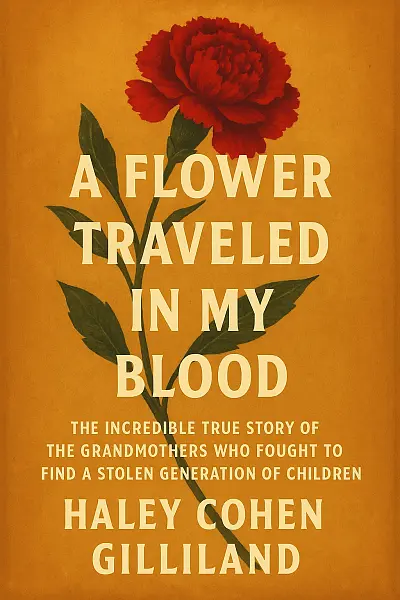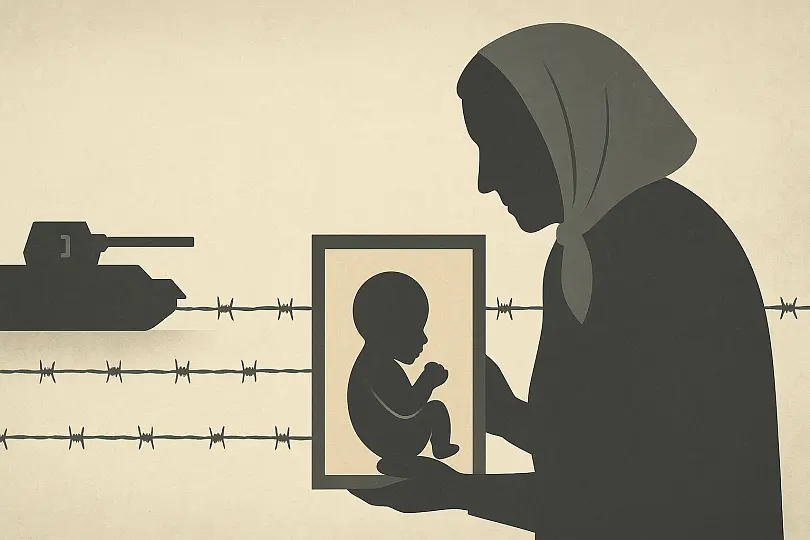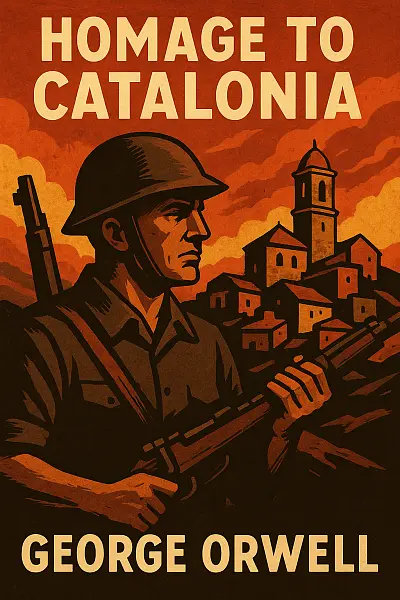
A Flower Traveled in My Blood: The Incredible True Story of the Grandmothers Who Fought to Find a Stolen Generation of Children
Patricia, a passionate young mother in 1970s Buenos Aires, vanishes at the hands of Argentina’s new dictatorship, leaving behind her devastated mother, Rosa. When Rosa learns her newborn grandson Guillermo has also been stolen, her heartbreak transforms into fierce determination.
Banding together with other grandmothers, Rosa helps launch the Abuelas de Plaza de Mayo—a grassroots movement to find their missing grandchildren and expose a nation’s darkest secrets. With every clue and confrontation, the stakes soar: identity, justice, and the future of an entire generation.
Gilliland’s narrative pulses with urgency, empathy, and hope—will these grandmothers manage to reclaim what was stolen from them?
"When memory is shattered by violence, love persists as a map leading lost generations back to themselves."
Let's Break This Down
The Author's Voice
Atmosphere:
Immersive, vividly charged, and emotionally raw, the book surrounds you with the restless tension of Argentina’s Dirty War—a setting where hope clashes with grief. There’s this palpable urgency, balanced by a delicate thread of resilience, that pulls readers right into the chaos and courage of the Grandmothers’ quest. Expect a mood that feels both haunting and luminous, full of shadows but seeded with persistent faith in justice and humanity.
Prose Style:
Gilliland’s writing is clear-eyed, compassionate, and precise, weaving intimate personal testimony with crisp reportage. There’s a lyrical undercurrent to her sentences—not flowery, but purposeful and evocative, choosing details that burst with color and emotion. Dialogue and quotations are woven seamlessly, bringing real voices to the forefront. The prose opts for honesty over embellishment—expect cinematic detail without melodrama and a tone that honors her subjects without drifting into sentimentality.
Pacing:
Steady, deeply engaging, and emotionally paced, the narrative alternates between gripping action and reflective pauses. You’re given time to breathe and process, but the story’s drive comes from the mounting momentum of the Grandmothers’ investigation. Chapters are carefully shaped, often ending with revelations or questions that make it hard to put down. Think of it as measured storytelling with a journalist’s drive and a memoirist’s heart—never rushed, but always compelling.
Character Development:
Rich and multi-dimensional, the real-life figures in these pages feel so close you can almost hear their voices—we’re given enough backstory, inner conflict, and transformation to make their crusade feel personal. Gilliland avoids oversimplifying: these are women with flaws, doubts, and breathtaking courage, rendered with nuance and intimacy. Readers will find themselves deeply attached, rooting for the same truths the Grandmothers seek.
Overall Literary Rhythm:
Expect a book that moves with a quiet but unstoppable force, balancing searing journalistic investigation with emotional human connection. It’s a tapestry of tenacity, resilience, and hope, offering an intimate window into historic trauma without losing sight of the voices who demand justice. The style never bludgeons—it leads, coaxes, and never lets go.
Key Moments
- Intense flashbacks of secret midnight abductions shattering family bonds
- Matriarchal resilience: Grandmothers transforming from quiet caretakers to fearless detectives
- Buenos Aires street protests captured in vivid, heart-pounding prose
- A chilling face-to-face with a perpetrator hiding in plain sight
- Searing exploration of identity—how bloodlines carry both trauma and hope
- Unflinching, journalistic storytelling that fuses investigative detail with lyrical reflections
- Final reunion scene—raw, cathartic, impossible not to tear up
Plot Summary
A Flower Traveled in My Blood traces the heartbreaking and courageous journey of the Grandmothers of the Plaza de Mayo in Argentina, a group of women who unite in the wake of the country’s brutal military dictatorship. The book opens by detailing the sudden disappearances of the grandmothers’ children and the terrifying realization that thousands of babies have been stolen and illegally adopted during the "Dirty War." As the grandmothers organize and risk their own safety, they search for any sign of their missing loved ones, ultimately uncovering a vast, state-sponsored effort to erase identities. The story climaxes as these women use DNA testing to reunite the first grandchildren—now adults—with their true families, creating ripple effects across Argentina and beyond. In the end, their resilience leads to vital legal and social changes, though the search for justice and the missing generation remains ongoing.
Character Analysis
The central "characters" are the Grandmothers themselves—ordinary women transformed into extraordinary activists by loss and love. They’re portrayed as determined, fiercely loving, and sometimes divided by grief, but always united by purpose. Over time, these women grow from fearful victims to empowered leaders, inventing new techniques for identification (like pioneering the use of mitochondrial DNA) and forging deep solidarity, even as some must balance hope with heartbreaking disappointments. Their personal arcs—from private mourning to public advocacy—highlight both individual resilience (as shown in figures like Estela Barnes de Carlotto) and collective empowerment.
Major Themes
One huge theme is memory versus erasure—Gilliland shows how dictatorships try to erase individuals but how memory and love persist. Another key theme is the power of maternal love and collective action—the Grandmothers’ relentless search not only for their own descendants but also for national accountability. Identity is everywhere: the stolen children’s struggle to make sense of their real heritage, and the country’s need to confront its trauma. The narrative repeatedly asks, "What does it mean to belong—biologically, emotionally, legally?" highlighting how truth can be reconstructed even in the face of systematic deception.
Literary Techniques & Style
Gilliland’s writing is urgent, emotionally direct, and intimate, blending investigative journalism with poetic flourishes. She often employs alternating points of view—from the Grandmothers to the stolen children—creating a tapestry of voices that makes the loss and hope feel universal but also deeply personal. Symbolism pulses through the title’s "flower," representing both the blood link and Argentina’s buried beauty. Vivid metaphors ("the city’s heartbeat pulsed with absence") and immersive sensory details place readers at the heart of marches, vigils, and clandestine meetings, while short chapters and shifting perspectives keep the pacing tight and suspenseful.
Historical/Cultural Context
Set in late 1970s and early 1980s Argentina, the book unfolds against the backdrop of the "Dirty War," when a military regime "disappeared" tens of thousands of dissenters. The story is inseparable from Argentina’s culture of public protest, Catholic traditions, and a legacy of political repression. This context sharply shapes the narrative—state terror, impunity, and global indifference become almost antagonistic forces, while emerging forensic science and international solidarity provide tools (and hope) for truth.
Critical Significance & Impact
A Flower Traveled in My Blood stands out for its unique lens on the usually male-coded narratives of resistance, spotlighting women’s activism and intergenerational trauma. Critics and readers alike have praised its blend of storytelling and ethical urgency, noting how it personalizes complex political history and amplifies the voices of those long silenced. The book not only preserves a crucial piece of twentieth-century history, but continues to inspire activism and dialogue about human rights and the power of justice, remembrance, and persistence.

Defiance blooms as grandmothers hunt for Argentina’s stolen children
What Readers Are Saying
Right for You If
If you’re the kind of reader who loves powerful true stories and gets completely absorbed by real-life accounts of courage and resilience, then A Flower Traveled in My Blood will probably hit all the right notes for you. Seriously, if you’re into narrative nonfiction—especially stories about social justice, family, and the fight against overwhelming odds—this book is basically tailor-made for your shelf.
- Fans of books like The Moment of Lift, The Diary of Anne Frank, or The Radium Girls will totally vibe with this.
- If topics like activism, women’s history, or Latin American history fascinate you, add this to your TBR immediately.
- Book clubs—especially those that love deep discussions and stories that spark debates—are going to have a field day with this one.
On the flip side, if you usually prefer light, feel-good reads or lose steam with heavier, emotionally intense nonfiction, this might feel a bit much. It’s not a fast-paced thriller or a quick beach read. The subject matter is heartbreaking at times—so if you’re looking to escape reality or avoid tough reads, you might want to pass this round and wait for something a bit more uplifting or less intense.
Basically: If you like books that challenge you, make you feel something, and shed light on injustices you didn’t even know about, you’ll be hooked. But if you want a breezy story or something purely entertaining, you’ll probably want to skip this and find something a little lighter.
What You're Getting Into
Get ready for a gripping ride through history with A Flower Traveled in My Blood.
In this powerful true story set in Argentina, a fearless group of grandmothers band together to search for generations of children stolen during a brutal dictatorship, risking everything to challenge silence and secrecy.
✨ Full of heart, resilience, and intrigue, this book blends investigative journalism and personal narrative to explore grief, justice, and the fierce love that can change the world.
Characters You'll Meet
-
Alicia Zubasnabar de De la Cuadra: Founding grandmother whose relentless search for her missing granddaughter helps launch the Abuelas de Plaza de Mayo movement. Her hope and perseverance symbolize the heart of the resistance.
-
Estela Barnes de Carlotto: Prominent activist and later president of the Abuelas, driven by the disappearance of her pregnant daughter. Her leadership and compassion shape the public voice and international impact of the group.
-
Chicha Mariani: Co-founder of the Abuelas whose quest to find her stolen grandchild becomes emblematic of the group's broader fight. Her meticulous documentation and advocacy are crucial to their breakthroughs.
-
Laura Carlotto: The missing daughter whose story deeply personalizes the stakes, motivating others and anchoring the emotional core of the narrative.
-
Haley Cohen Gilliland: Journalist and author who intertwines her own journey of discovery with the legacy of the Abuelas, offering contemporary context and reflecting on memory, justice, and the power of truth.
More Like This
If the moving exploration of truth and remembrance in The Mothers by Brit Bennett left you breathless, you’ll find a similarly resonant emotional power in A Flower Traveled in My Blood. Both books delve into the ripple effects of generational secrets and the way women shoulder the burden of both loss and hope—though where Bennett explores personal loss, Gilliland paints her narrative with historical urgency and activism.
Fans of The Book Thief by Markus Zusak will also recognize that intimate, human perspective set against the harsh backdrop of political violence. Gilliland’s writing, reminiscent of Zusak's ability to blend the beauty and tragedy of resistance, brings a stark yet hopeful lens to the devastation wrought by Argentina's dictatorship, offering impossible choices and unforgettable acts of bravery.
There are unmistakable shades of the TV series Unbelievable in the compassionate but unflinching way the author handles trauma and systemic injustice. Both works confront abuses of power and the struggle to reclaim truth with a sense of deep empathy for survivors—transforming statistics and headlines into indelible, fiercely individual stories you won’t soon forget.
Critic's Corner
How long can memory outlast power—and what does it cost to turn private grief into public resistance? In A Flower Traveled in My Blood, Haley Cohen Gilliland invites us to confront questions of courage and complicity, tallying the true price of a society determined to forget as a few refuse to let go of the past. With the unrelenting force of a mystery and the emotional intimacy of a family memoir, this narrative burns with urgency, asking what we owe not just to our loved ones but to truth itself.
Gilliland’s craft is both rigorous and compassionate, swapping journalistic detachment for a distinctive voice that manages to be empathetic without falling into sentimentality. Her prose is clean, direct, and purposeful: she anchors the sweeping historical events in tactile, intimate details—the tapping of a typewriter, the compressed hope in a grandmother’s handshake. Structured around the intertwined lives of Rosa, Patricia, and Guillermo, the book masterfully braids individual destinies with national trauma. Dialogue and interiority are handled with a light but attentive touch, resisting melodrama in favor of complexity and contradiction. Gilliland also proves herself a deft narrator, balancing the gripping momentum of a human-rights thriller with lyrical moments of pause—reminding readers of the humanity at the heart of the story. Her use of non-linear chronology mirrors the disorientation of her subjects and heightens the investigative tension, pulling us deeper as the Abuelas unravel not just mysteries, but stolen identities.
At its core, this is a story about memory, justice, and the limits of forgiveness. Gilliland interrogates how personal loss is politicized, how grief galvanizes action rather than resignation. The Abuelas’ fight is situated within a broader reflection on the legacy of state violence—how a regime’s lies can corrode family, language, and even DNA. Yet the book is remarkably nuanced in its portrayal of hope: justice is partial, victories are bittersweet, and “closure” is an impossible dream. It wrestles with urgent ethical dilemmas—what makes someone “your child”? Is identity determined by blood, or by love, or by history? As a meditation on the power and peril of remembrance, the book pulses with contemporary relevance; it suggests that the search for truth is always unfinished business, echoing through generations.
For readers of Say Nothing or The Immortal Life of Henrietta Lacks, this account stands shoulder to shoulder, blending precision reportage with narrative propulsion. Gilliland’s voice recalls the cool empathy of Patrick Radden Keefe, but she carves out her own space by foregrounding women’s resilience—placing the Abuelas not as victims, but as relentless protagonists in a battle against silence. The book’s genetic sleuthing and meditations on identity loop it into a growing canon of trauma reporting, yet it thrums with singular emotional force.
If there’s a flaw here, it’s that Gilliland’s emotional restraint sometimes holds the reader at arm’s length, and the book’s non-linear structure can occasionally muddy timelines. Still, her rigor and empathy deliver a searching, unforgettable account—a testament to resistance and the work of remembrance. A Flower Traveled in My Blood isn’t just a history: it’s a haunting, necessary call to witness.
Community Thoughts
i thought i could skim this but then BAM, that scene where the grandmother finally confronts the official about her missing grandchild? chills. i kept turning pages, totally hooked, couldn’t sleep till i finished.
I was not prepared for the way Abuela Estela just lodged herself in my thoughts. Every scene with her hit so hard I kept thinking about her long after closing the book, wondering how she found the strength to keep fighting.
i can’t stop thinking about Estela’s courage. Her relentless hunt for truth crashed into my dreams. This book is a punch to the gut and a lifeline both, leaving me raw and grateful all at once.
i swear i was just going to skim a few pages, but then that scene with Estela—her hands trembling as she clutched the faded photo—absolutely wrecked me. now i can’t stop thinking about her.
I picked it up just to skim, and now I'm spiraling thinking about Abuela Delia’s relentless hope. Seriously, her voice is still echoing in my head. Did NOT expect to get this invested. Why did no one warn me?
Leave Your Review
Local Take
Why It Matters
A Flower Traveled in My Blood strikes a deep chord here given our own legacy of families torn apart by historical traumas—think adoption scandals and hidden pasts, especially those linked to wartime displacement and forced re-education movements.
- Themes of memory, justice, and intergenerational healing—these feel incredibly relatable. Our culture prizes family unity and remembrance, so the grandmothers’ relentless fight mirrors the reverence shown to elders in our own stories.
- Certain plot points—like the secrecy of state institutions and the courage to speak out—hit close to home when thinking about our reckoning with state power and truth-telling in the post-dictatorship era.
- The book’s weaving of personal testimony with broader history echoes our literary tradition of testimonial narratives, but its focus on female resistance and grassroots activism offers a bold, refreshing twist on who gets to reclaim the past.
Ultimately, Cohen Gilliland’s book feels like an urgent, heartfelt mirror to the collective longing for justice and reconciliation that still ripples through our national conversation.
Food for Thought
Notable Achievement:
“A Flower Traveled in My Blood” has garnered widespread acclaim for shedding light on the history and legacy of Argentina’s dictatorship and the grandmothers’ relentless search for their stolen grandchildren; the book was longlisted for the 2024 Andrew Carnegie Medal for Excellence in Nonfiction and has sparked vital cross-cultural conversations about truth, reconciliation, and memory in human rights struggles.
If you’re looking for a true story with real emotional power and undeniable cultural resonance, this one’s absolutely worth your time!
Like what you see? Share it with other readers







